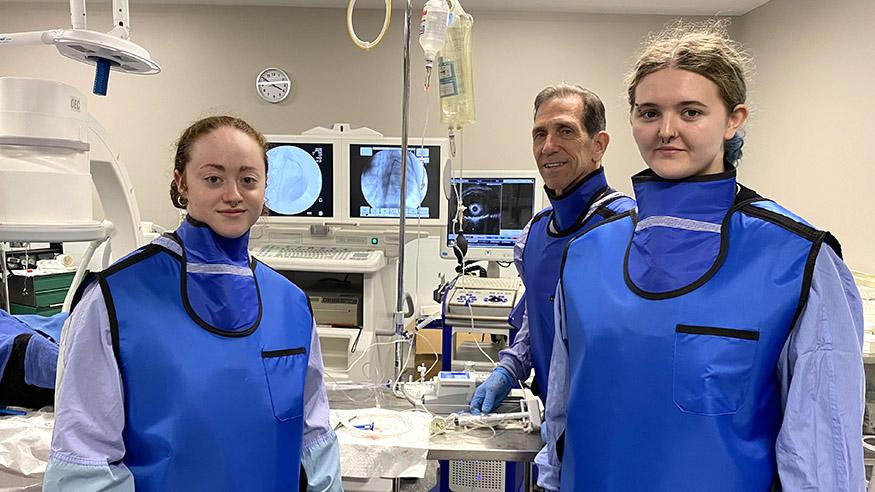
From the left, pre-med students Brianna Greiner ’26 and Elise Krumenacker ’28 with Dr. Michael Sturek '79, chief scientific officer for the CorVus Foundation
Sturek '79 finds two apprentice 'swine cardiologists'
Dr. Michael Sturek ’79 is one of five children raised by their mother, Shirley, after their father died. His former Augustana roommate, Willie Rucker ’79, also had a mother named Shirley.
One in a small town in southern Illinois, the other in a Chicago suburb, the two Shirleys raised families on their own — eventually sending two sons off to Augustana, where they bonded quickly.
Today Dr. Sturek is chief scientific officer for the CorVus Foundation, a non-profit research organization focused on cardiovascular disease, diabetes and obesity. With a goal to “translate science to cures,” CorVus raises a colony of Ossabaw miniature swine at its facility in Crawfordsville, Ind., for its own research and for researchers around the world.
“Teaching and learning by discovery are the most fulfilling parts of this vocation.”
Why these particular pigs? Because what they learn from studying Ossabaw pigs translates very well to humans. According to Dr. Sturek, “We have the world’s best animal model that enables studies of therapies for heart failure and heart disease.”
Now he is reaching out for “apprentice ‘swine cardiologists’” to study coronary artery disease through heart catheterization, essentially using the same methods as with humans.
Inspired by his Augustana education and the two “superwomen” named Shirley, Dr. Sturek has established the Shirley Research Internship in Biomedical Sciences for Augustana students planning careers in medicine and/or biomedical research. This summer the internship was awarded to pre-med students Brianna Greiner ’26 and Elise Krumenacker ’28.
Greiner’s ultimate goal is to serve as a doctor in rural areas. She has dreamed of being a doctor since she was a child.
“As I’ve matured and progressed at Augustana, I have shifted my focus to rural medicine,” Greiner said. “I believe it is a big need nowadays, especially when you have areas where people have to drive absurd distances to get help.”
Growth is important to Greiner, who wants to contribute to medical research as a student and after Augustana. Excited about working with the CorVus team, she said, “I know I will learn a lot, meet a lot of wonderful people and carry this experience with me as I grow.”
Krumenacker already has sights on an M.D.-Ph.D. program specializing in pediatric hematology and oncology after Augustana. “As my future plans include both clinical and research practices, I can apply each new experience gained from CorVus Biomedical into both sides of my future career,” she said.
For Dr. Sturek, “Teaching and learning by discovery are the most fulfilling parts of this vocation.”
He said the interns’ learning experiences this summer will range from clinically relevant measures to cell biology. He’ll also teach them about data analysis and how to write a research abstract, specifically for presenting at Augustana’s annual Celebration of Learning. They may even present their findings at the Indiana Physiological Society meeting and/or the national meeting of the American Physiological Society.
One of the most important things the Shirley interns will learn? “Perseverance,” he said.
The two Shirleys inspired this quality in their sons (Willie Rucker is now a dentist), but that’s not the only reason why it’s important for the Augustana interns.
Perseverance fuels research, and then delivering those findings to the public. Perseverance is needed for practicing rural medicine, or pursuing both medical practice and research.
And as Dr. Sturek knows, it takes perseverance to translate science into cures.
